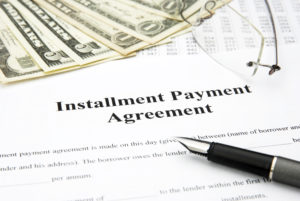If you are an individual taxpayer, you may have outstanding tax liabilities owed to the IRS. Even worse, penalties and interest continue to accrue, and the total liability grows more and more. This can obviously create anxiety on the taxpayer’s part, especially if those liabilities start to approach six figures. Fortunately, the IRS has expanded its test criteria for streamlined installment agreements.[1]Set to expire on September 30, 2018, the new-and-improved streamlined installment agreements should help taxpayers. Not only will the test criteria help taxpayers catch up on their tax liabilities, but it will also stop further IRS collection efforts.
Installment Agreements – Prior
Prior to the recent change in test criteria for IRS installment agreements, there was no hope for a taxpayer with a “larger” tax balance to obtain a streamlined installment agreement. The benefits of a streamlined agreement were mainly extended to balances up to $25,000. Taxpayers could obtain a payment arrangement over a period of up to 72 months (or less depending on the collection statute expiration date). Further, these taxpayers would not need to produce Collection Information Statements or provide direct debit payments, and no determination would be required for a Notice of Federal Tax Lien.
Taxpayers with balances between $25,001 and $50,000 could also obtain a streamlined agreement but with a few strings attached. Taxpayers would need to file a Collection Information Statement to verify their ability to pay in the event of a previous default on their tax liabilities. Moreover, taxpayers would be required to make payments via direct debit in order to qualify for a streamlined agreement and avoid a determination for a Notice of Federal Tax Lien.
For those taxpayers with an outstanding balance between $50,001 and $100,000, they did not qualify for streamlined processing.
Installment Agreements – Current
Currently, the IRS has implemented its test criteria to expand the scope of taxpayers that qualify for streamlined agreements. Again, taxpayers with “smaller” balances enjoy more of the benefits under the test criteria. Taxpayers with balances up to $25,000 enjoy the same criteria as before: payment period of up to 72 months, a Collection Information Statement is not required, direct debit payments are not required, and a determination for a Notice of Federal Tax Lien is not required.
Similarly, those taxpayers with balances up to $50,000 do not experience much of a shift in the criteria. Under the test criteria, a Collection Information Statement is no longer required–whether an earlier default occurred or not. Further, direct debit payments are preferred but not required. However, if a taxpayer does not agree to a direct debit payment arrangement, a Notice of Federal Tax Lien determination will be made.
The big change under the test criteria is for those taxpayers with balances up to $100,000. Taxpayers may obtain a payment arrangement over a period of up to 84 months, not 72or less depending on the collection statute expiration date. Further, a Collection Information Statement is not required if the taxpayer agrees to make payments via direct debit or payroll deduction. On the other hand, if the taxpayer does not agree to a direct debit or payroll deduction arrangement (as it is not required), he or she will need to provide a Collection Information Statement. Finally, a determination for a Notice of Federal Tax Lien is required.
Why Does It Matter?
One of the important developments in the streamlined agreement criteria is the fact that certain financial information does not needto be disclosed. A taxpayer with a total amount due of $80,000 in taxes, penalties, and interest would not need to disclose his or her financial information if he or she signed up for a direct debit installment agreement. That is important to note for those taxpayers who have substantial assets or have a sizeable monthly net income. It is highly possible that these taxpayers do not want to disclose these assets or income because Uncle Sam may extend an open hand. Or, perhaps there are other reasons a taxpayer wants to avoid disclosure. Whatever the case may be, taxpayers can avoid disclosures with a streamlined installment agreement.
It should be noted, however, that setting up an installment agreement does not “stop the clock” for purposes of penalties and interest. The faster a taxpayer can be set up with a payment arrangement the better. We can all sympathize with Arthur Godfrey, former radio and television broadcaster, who once said, “I’m proud to pay taxes in the United States; the only thing is, I could be just as proud for half the money.” But, assuming that is not an option for the taxpayer (a la an Offer in Compromise), a streamlined installment agreement is certainly a viable option to consider when finding the road back to tax compliance and avoiding IRS enforcement.
[1] See Streamlined Processing of Installment Agreements, IRS (Apr. 28, 2018).
Representation in Tax Audits & Appeals
Need assistance in managing the audit process? Freeman Law’s team of attorneys and dual-credentialed attorney-CPAs regularly represents taxpayers before the IRS and Texas Comptroller. Our team also provides tax return-related representations and helps taxpayers navigate state tax laws. Our Firm offers value-driven services and provides practical solutions to complex issues. Schedule a consultation or call (214) 984-3000 to discuss our tax representation services.

